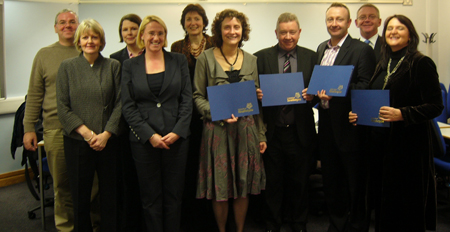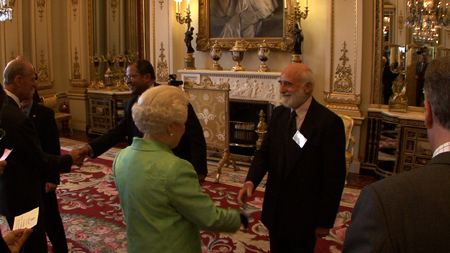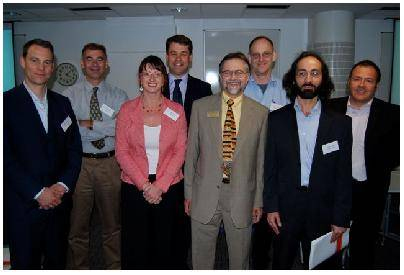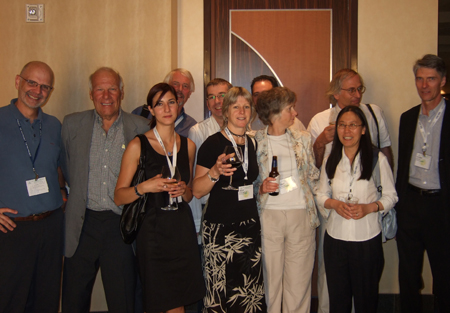
| Aug 2008 | View back issues |

|

|

|
| August 2008 | ||
|
Click on any of the headlines to go to the story:
SBS First in Scotland with European Quality Award for Executive Coaching. Strathclyde Business School has achieved a prestigious European Quality Award for our Postgraduate Certificate in Executive Coaching, supporting professional standards in the most popular and growing leadership development initiative in the UK. SBS is the first provider in Scotland to receive this accolade, joining the leading business schools and other UK providers of coaching and mentoring education in the UK and Europe. The award is testament to our excellence in this area, a field of rapidly developing academic theory and practice for professional leadership and management development. Why does the EQA award matter? The EQA award is managed by the European Mentoring and Coaching Council (EMCC). The EMCC is a major force in professionalising coaching and mentoring in Europe, developing standards, ethics and codes of conduct for coaching and mentoring programmes. The EMCC aims to help organisations, buyers of coaching and individuals work to promote good practice and the expectation of good practice in mentoring and coaching across Europe. Stephen Gibb, programme director said "Coaching and Mentoring are now widely established as an integral part of developing leaders in organisations, an area in which SBS aims for excellence. The EMCC EQA award is recognition of the high standards our specialist professional programme for developing Executive Coahces. It comes at the right time to boostour profile as we further innovate, and develop other coaching and mentoring qualifications in the business school, focused on our new Certificate, Diploma and MSc in Coaching and Mentoring". Professional and SBS seals of Approval Michael Murray, CEE Coordinator states; 'The EQA award recognises our excellence in leadership development systems, and is extremely important both for our alumni and attracting future students in a hihgly competitvie and sophisticatdd market. Alumni now have in addition to the SBS reputation and standing a professional body 'seal of approval' in coaching which should help them develop their careers across the UK, Europe and in all areas where demand for leadership and management development is growing' The Postgraduate Certificate in Executive Coaching programme still has a few places for our second 2008 intake enrolment for October 2008, with a further programme starting January 2009. Further info from; Michael Murray http://www.strath.ac.uk/business/cee 
Back to top Professor Paliwoda judges the National Business Award Professor Stan Paliwoda, Department of Marketing, was a judge in the National Business Awards for Scotland. The awards presentation takes place on the 11th September at the Hilton Hotel, Glasgow. Back to top Queen's Award for Entrepreneurship As part of his role as a member of the Enterprise Promotion Assessment Committee Colin Bottomley of the Hunter Centre for Entrepreneurship attended an awards ceremony at Buckingham palace on 14th July 2008, hosted by Her Majesty, Queen Elizabeth 2nd - this ceremony is an annual event at which winners of the Queen's Award for Enterprise are welcomed by the Queen at a reception at Buckingham Palace. At the function, at which some 10 members of the Royal Family were in attendance, organisations that had received the business awards were represented as were the winners of the individual Enterprise Promotion Awards. The individual winners received their awards form the Princess Royal prior to all the attendees being welcomed formally by the Queen and the Duke of Edinburgh. Some 250 individuals attended the function, including award winners and members of the Queen's Award Assessment Committees.  Colin bottomley meets the Queen Back to top 9th trip to Buenos Aires for professor Mason  Professor Colin Mason of the Hunter Centre for Entrepreneurship made his 9th trip to Buenos Aires - the home of the tango - at the end of
July to teach on the 7th cohort of the "Masters in Economy and Industrial Development specialising in small and medium enterprises" at
Universidad Nacional de General Sarmiento. Colin has taught on every cycle of the two year course which started in 1996 - the only
international teacher to do so - contributing sessions on entrepreneurship theory in year 1 and and entrepreneurial finance in year 2. The
course director is Dr Hugo Kantis, the leading authority on small business and entrepreneurship in Latin America. Dr Kantis made a brief
visit to the Dr Mason Hunter Centre last November when he was in Glasgow to participate in the Institute of Small Business and Enterprise conference
in Glasgow.
Professor Colin Mason of the Hunter Centre for Entrepreneurship made his 9th trip to Buenos Aires - the home of the tango - at the end of
July to teach on the 7th cohort of the "Masters in Economy and Industrial Development specialising in small and medium enterprises" at
Universidad Nacional de General Sarmiento. Colin has taught on every cycle of the two year course which started in 1996 - the only
international teacher to do so - contributing sessions on entrepreneurship theory in year 1 and and entrepreneurial finance in year 2. The
course director is Dr Hugo Kantis, the leading authority on small business and entrepreneurship in Latin America. Dr Kantis made a brief
visit to the Dr Mason Hunter Centre last November when he was in Glasgow to participate in the Institute of Small Business and Enterprise conference
in Glasgow.
Back to top Glasgow UNESCO 'City of Music', one of only three in the world. The radio station at the Hunter Centre for Entrepreneurship - Celtic Music Radio - was part of the event and will broadcast and netcast interviews with the Director General of UNESCO - Mr Matsuura, the music and other Scottish representatives this afternoon from the Hunter Centre, accessible on a radio on 1530 AM and on any PC worldwide at www.celticmusicradio.net details are below. The radio station at the Hunter Centre, part of its undergraduate course on 'Entrepreneurship in the Creative Industries' now has some 40,000 listeners in Scotland and world wide amongst the Scottish Diaspora. The announcement provides a whole new range of opportunities for those in the University, both staff and students, who are interested in the creative industries and increased prestige for Glasgow, the University, CMR and the Hunter Centre. Back to top New publication: Regional aid and EU competition policy  Fiona Wishlade has contributed an article to a recent edition of Regional Studies. The article tracks the evolution of the European
Commission's current policy for disciplining regional aid and explores the relationship between national and EU policies and the way in
which the EU promotes cohesion, competition and competitiveness. Fiona Wishlade has contributed an article to a recent edition of Regional Studies. The article tracks the evolution of the European
Commission's current policy for disciplining regional aid and explores the relationship between national and EU policies and the way in
which the EU promotes cohesion, competition and competitiveness.The article, entitled "Competition and Cohesion - Coherence or Conflict? European Union Regional State Aid Reform Post-2006" can be accessed at http://www.eprc.strath.ac.uk/eprc/news.cfm Back to top Strathclyde puts the 'business' into music business A University of Strathclyde course teaching students how to make a successful business in the arts has been highlighted as a European leader in an EU report. The course on Entrepreneurship in the Creative Industries offers an insight into business opportunities where culture and the arts figure strongly, particularly in the music industry. It has been singled out in a report by a European Commission expert group as an example of how entrepreneurship can be taught in higher education. The study, entitled Entrepreneurship in Higher Education, identifies the course as one which gives students the grounding they need to combine artistic talent with a sound business sense. The course is run at the Hunter Centre for Entrepreneurship at Strathclyde Business School. Professor Colin Mason, the Centre's Academic Director, said: "Music, film, literature and other creative fields are huge industries worth vast sums with a lot of entrepreneurial opportunities" "Many arts graduates struggle to make a decent living in the cultural industries and have to hold multiple jobs. Often these jobs are part-time or temporary or they may be working of a freelance basis. Our course gets students to think about how they can create their own businesses by teaching them how to recognize, evaluate and exploit opportunities." The course was developed at the request of Strathclyde's Department of Creative and Aesthetic Studies, which instructs students on the composition, performance and production of music. It is designed to complement this music education by giving students an introduction to the creative economy, the skills of an entrepreneur, and ways to identify and evaluate a business opportunity. Students are also tutored on seeking financial sources for a business, on how they might attract investment and on the protection and use of intellectual property - an issue which is becoming increasingly prominent in creative industries. Students work in groups to develop their own business idea and at the end of the course have to 'pitch' this idea to an audience of Hunter Centre staff, entrepreneurs and advisers. The course is mainly aimed at students on the University's renowned Applied Music course but any student at the University may enrol. The Strathclyde course is one of only five examples cited in the EC report of good practice at specific UK institutions. Professor Mason said: "For all the importance of artistic endeavour, business knowledge is essential for anyone who wants to create value from their talent. "Moreover, by giving students a solid entrepreneurial background, our course is aimed at helping the arts to flourish and the economy to prosper." The study finds that education has a crucial role to play in stimulating business start-ups and fostering a culture which is open to entrepreneurial development. These aims are central to the aims of the Lisbon Strategy, the EC's programme for employment and economic growth. It makes a number of proposals, including task forces for bringing more entrepreneurship into education, awards for entrepreneurial universities and legislation to support relations between private businesses and universities. Back to top Strathclyde Service Science Workshop University of Strathclyde hosted a one day workshop on Service Science with academic and industrial participants from the UK. The workshop featured an invited talk by Professor Ray Fisk, Texas State University - San Marcos and a panel of academic and practitioner members, including Professor Alison Morrison the vice dean research for the Strathclyde Business School. The aim of the workshop was to look at the IBM proposal for Service Science with a critical review. The workshop concluded with proposing a number of research agendas in the area of service as a system. The workshop was sponsored by the university's research enhancement group and it was a collaborative work between the Department of Management Science and Strathclyde Institute for Operations Management (SIOM).  From right, three members of the organising team: Umit Bititci (SIOM), Farhad Shafti (Management Science) and Robert Van Der Meer (Management Science), with Ray Fisk, Alex Guild (RBS, panel member), Aileen Wallace (NAB Group), Chris Cromack (IBM, panel Member) and Heiner Evanschitzky (Marketing, panel member). From right, three members of the organising team: Umit Bititci (SIOM), Farhad Shafti (Management Science) and Robert Van Der Meer (Management Science), with Ray Fisk, Alex Guild (RBS, panel member), Aileen Wallace (NAB Group), Chris Cromack (IBM, panel Member) and Heiner Evanschitzky (Marketing, panel member).
Back to top Equal Pay - can we do better than this? Kay Gilbert was invited to attend the above seminar by Equality and Human Rights Commission (EHRC) which was held in London on 31 July 2008 and was chaired by Professor Linda Dickens MBE. The seminar addressed the challenges currently facing equal pay practitioners. With the event being "by invitation only" enabled experts to pool their ideas to come up with potential solutions that the Commission could subsequently refine through debate and discussion. Back to top Professor Phil Taylor & Dr Dora Scholarios The research collaboration between Professor Phil Taylor and Dr Dora Scholarios of the Department of Human Resource Management and Drs. Ernesto Noronha and Premilla d'Cruz of the Indian Institute of Management at Ahmedabad has seen the publication of an article in the high-profile Indian publication, Economic and Political Weekly. The article entitled 'Employee Voice and Collective Formation in the Indian ITES-BPO Industry' addresses a key issue in the developing Indian outsourced and offshored sector. Back to top Congratulations - Dr Paul Hibbert  Dr Paul Hibbert, Department of Management, has been awarded the Best Paper Prize of the Research Methodology Division of the British Academy of Management. He will be presented his award at the British Academy of Management conference, taking place between 9 - 11 September 2008.
Dr Paul Hibbert, Department of Management, has been awarded the Best Paper Prize of the Research Methodology Division of the British Academy of Management. He will be presented his award at the British Academy of Management conference, taking place between 9 - 11 September 2008.His paper, Reflexivity and the Researcher: Reflection, Recursion, Participation. Hibbert, P., Coupland, C. and MacIntosh, R.(2008), seeks to support a better understanding of the types (or modes) of reflexivity which may be involved in the practice of research, and show how these may be experienced sequentially, as a progressive process. Narrowly missing a second best paper award, the US Dr Hibbert Academy of Management, shortlisted Professor Chris Huxham and Pam Hearne's paper, under the Academy of Management ODC Division 'Rupe Chisholm' Best Theory to Action Paper Finalist, for: Huxham, C., Hibbert, P. and Hearne P. (2008) Claiming Collaborative Success: Signifiers and Caveats. Back to top Academy of Management Conference - Anaheim Several staff attended the Academy of Management conference in Anaheim this year. Staff associated with SBS were involved in 33 conference events: paper presentations and professional development workshops. All contributions are at least triple blind reviewed. In the photograph are: Fran Ackermann, Viktor Dorfler, Colin Eden, Paul Hibbert, Chris Huxham, Shenxue Li, Paul Nutt, Belgin Okay, and Visiting Professors Mark Ebers (University zu Koeln) and Joeg Sydow (Freie Univerity Berlin). Pam Hearne and John Finch also contributed to the conference but did attend. On the left is the programme chair Jim Walsh. The conference was attended by over 9000 academics and executives. 
Back to top BAM's Beasley Award Congratulations to Catherine Demangeot who is to receive BAM's Beasley award for an outstanding paper by a doctoral student (or recent doctoral graduate). This is a fantastic achievement as the award is not made in any year unless there is a truly excellent paper among the submissions. The presentation is at the BAM 2008 Conference Dinner at Harrogate on 11 September. Back to top The Oxford Handbook of Interorganizational Relations THE OXFORD HANDBOOK OF INTERORGNIZATIONAL RELATIONS (Eds Steve Cropper, Mark Ebers, Chris Huxham and Peter Smith Ring) has been published by Oxford University press. The Handbook was conceived in the earliest days of BAM's Interorganizational Relations Special Interest Group (SIGIOR) and, in more recent times, benefited from discussions among SIG members at various meetings and workshops. The editors also received important feedback at a meeting of AIM senior fellows. The Handbook comprises of three main sections as well as introductory and concluding chapters by the editors. In the first of the three sections authors address various manifestations of inter-organizational relationships IORs, which they define as inter-organizational entities (IOEs) including discussions of research on: industrial districts, alliances and joint ventures, social networks, supply chain networks, policy implementation networks, voluntary and community sector partnerships, local and regional development partnerships, technology partnerships, public sector service collaborations and project based collaborations. Theoretical and disciplinary perspectives on the study of inter-organizational relations (IOR) are treated in the second major section of the Handbook. These include: Social Network perspectives, Evolutionary perspectives, Transaction Costs Economics perspectives, Critical perspectives, Social Psychological perspectives, Political perspectives, and Legal perspectives. In addition, a chapter is devoted to research exploring the management of inter-organizational relationships. The third main section of the Handbook addresses research on a variety of topics related to IORs. These include: Trust, Power, Social capital, Learning and Innovation, Dynamics, Temporality, and Change, Intervention and Evaluation. A total of forty-six authors contributed to the 25 chapters contained in the three main sections. They represented thirty-two universities in Europe, Asia and North America, a number of whom were AIM Fellows, including the four Editors. The introductory chapter by the four Editors provides readers with a brief history of the evolution of IOR as well as a discussion of the Editors' approach to the subject matter. Readers are also provided with a roadmap to use of the material contained in the Handbook. In the final chapter of the Handbook the editors provide their assessment of IOR as a field of study, concluding that knowledge on IOR, IORs and IOEs remains highly segmented in what they describe as silos and that while accumulation of knowledge related to IOR had grown steadily over the past half-century, comparative and integrative work remains scarce. They identify a number of challenges for those interested in furthering an understanding of IOR. The book is available at 20% discount (£68 instead of £80) until 30 September if purchased directly from OUP (contact: Keira McDermott, Oxford University Press, Tel: +44(0)1865353650, email: keira.mcdermott@oup.com). This discount applies to university libraries too. Back to top International Division - New Recruits The University of Strathclyde Business School has been offering its flagship 2 year, part-time MBA programme to managers and business leaders in the Gulf, Bahrain, Oman and the UAE since the early 1990s. To date, 400+ individuals, indigenous and expatriates from 38 nationalities have earned their Strathclyde MBA in the Gulf, and hold senior positions across both the MNC and public sectors. In 2008 University of Strathclyde Business School launched in the UAE a Masters in Marketing and a Masters in Entrepreneurship, taught by academics from the University. All programmes offered in the UAE are accredited by the Ministry of Higher Education. The Business School recently appointed Dr. Catherine Demangeot as Lecturer and Mr. Ranjit Gajendra as Regional Manager for UAE and the Gulf. Catherine spent her 'first life' in print and web publishing. She has 15 years' experience in London and Dubai, where she was responsible for developing and managing a book list which grew from 50 to 140 titles in just four years. She has also worked on and developed a number of web publishing concepts. She then moved on to consultancy roles. Her engagements span the areas of strategy, marketing and communication strategy. The topic for her doctoral research was inspired by her publishing background. Just as her focus was on how to make books reader-friendly, she wondered how online shopping environments can produce desirable consumer responses. Her thesis used a multi-disciplinary approach to develop a gestalt of consumer perceptions of online shopping environments (extending Kaplan and Kaplan's (1982) Preference Framework). The impact of these perceptions on consumer value and site commitment was conceptualised and tested using structural equation modelling. The findings highlight the central role played by exploratory attributes in driving site commitment. Catherine moved to Dubai 17 years ago, drawn by the multi-cultural perspective the location afforded. Her work with students, colleagues and clients of many different nationalities, cultures and outlooks has only strengthened her interest in researching the main elements which make up one's identity in consumption and work settings - values, ethnocentrism, religious values, psychographics, culture, nationality, etc. She teaches different components of Managing, Strategy and the International Environment on the MBA programme. Having been a Local Counsellor for many years, she is now involved with creating a Local Counsellor community of practice across Strathclyde's nine international centres. She is based in Dubai, and travels back to Glasgow regularly. Ranjit, on completing articles with KPMG and work in accounting, financial management, tax advisory and management consulting and tutoring of professional courses in the UK and Sri Lanka, came to the Gulf in the 80s to launch and manage a pioneering venture, management consulting and training for the region, in Dubai. During the early years he was instrumental in setting up joint-venture, small and medium scale enterprise in the UAE and introducing a range of training programmes for the corporate sector. A founder-member of the Higher Colleges of Technology in Dubai, a federal government funded tertiary education system for the indigenous population he held numerous senior management and leadership positions including Chair, Business Programmes, Chair, Programme Quality Assurance and Dean, Management Systems and Community Development, in the education, development and employment of a generation of Emirati youth and the international accreditation of undergraduate programmes. Working with government and industry he developed public-private partnership initiatives, managed industry and government advisory committees and was a member of the academic and administrative councils, policy bodies of the Higher Colleges of Technology. Most recently as General Manager, CERT, centre of excellence for applied research and training, the commercial arm of the Higher Colleges of Technology in Dubai he established partnerships with academic and vocational institutions, professional bodies and first-for-the-region technology ventures. Ranjit has an undergraduate degree in mathematics and postgraduate qualifications in business administration, information systems and e-business and has taught courses in management, accounting, economics and finance for undergraduates and those seeking professional qualifications. He is a Fellow of the Chartered Institute of Management Accountants and Member of the Chartered Institute of Marketing and Australian Institute of Management. Back to top |
||
| Back issues of the SBS Newsletter are available on our website: http://www.sbs.strath.ac.uk/newsletter |